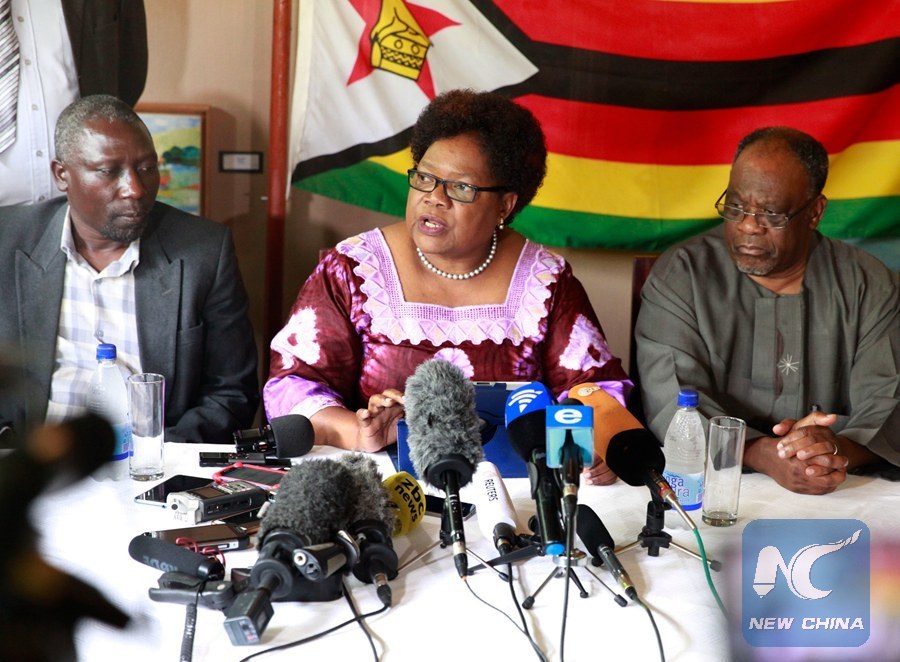
Zimbabwean Former Vice President Joice Mujuru in a media conference in Harare, Zimbabwe, on November 16, 2017. Mujuru called for a transitional arrangement that should attend to issues of economic recovery and electoral reforms following the military takeover of government on Tuesday night. (Xinhua)
HARARE, Nov. 16 (Xinhua) -- Zimbabwean President Robert Mugabe's former deputy Joice Mujuru on Thursday called for a transitional arrangement that should attend to issues of economic recovery and electoral reforms following the military takeover of government on Tuesday night.
Mujuru, who Mugabe fired in 2014 alleging that she was trying to topple him, is now the president of the National People's Party. She also leads a grouping of opposition parties (People's Rainbow Coalition) as its presidential candidate for the 2018 elections.
She told a press conference that her coalition urged Zimbabweans to observe the rule of law as the nation sought to restore constitutional democracy.
"We are at a time that peace can only be realized through maximum restraint and constructive exchange of ideas as Zimbabweans. Going forward as PRC we believe the present political development requires collective engagement and national dialogue of all critical stakeholders in our country," she said.
Apart from politicians, such stakeholders should include faith-based organizations, civil society, workers and students, she said.
"For the success of such collective engagement there is no doubt that we are in need of a transitional arrangement that should attend to key issues of economic recovery and electoral reform processes," she added.
Mujuru would not be drawn into commenting on the military takeover but said elections should be free and fair and that observers drawn from the region, the African Union and the international community under the auspices of the United Nations.
Meanwhile, the capital city Harare remained calm on the second day of the military action while President Robert Mugabe remained holed up at his private residence in the northern suburbs of the city.
There was less military presence on the roads in the city center and roads that had been blocked on Wednesday had been reopened for the smooth flow of traffic.
However, some cars issued to officers in the Central Intelligence Organization which had been left on the roads on Wednesday following instructions from soldiers remained there.
South African President and Southern African Development Community chairperson Jacob Zuma on Wednesday called for a meeting of an organ of the regional bloc to discuss the situation in Zimbabwe to be held Thursday afternoon in the Botswana capital Gaborone.
A statement from the SADC secretariat said that the meeting would be attended by ministers responsible for foreign or external affairs from the SADC Organ Troika member states -- Angola, Tanzania and Zambia and the SADC Council chairperson who is the Minister of International Relations and Cooperation for South Africa.
Zuma also on Wednesday dispatched special envoys to Zimbabwe and Angola to meet Mugabe and the Zimbabwe Defense Forces commanders who executed the takeover of government.
The special envoys will also be sent to Angola to brief President Joao Lourenco, who is the current chairperson of the SADC Organ on Politics, Defense and Security on the situation in Zimbabwe.
Unconfirmed reports said closed door meetings were underway Thursday, but some citizens were becoming restless over lack of information on what was happening on the ground.
Many people are resorting to social media in search of information but most of what is coming out there is not reliable and unsourced.
The African Union (AU) on Wednesday called on stakeholders in Zimbabwe to address the situation in accordance with the country's constitution.
AU Commission chairperson Moussa Faki Mahamat said in a statement Wednesday that the AU was closely monitoring developments in Zimbabwe.
Mahamat said that the crisis should be resolved in a manner that promotes democracy, human rights and socio-economic development of the country and expressed the AU's commitment to working with SADC to ensure a peaceful resolution of the crisis.

